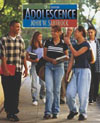John W. Santrock,
University of Texas, Dallas
| accommodation | Occurs when individuals adjust to new information.
|
 |
 |
 |
| adolescent egocentrism | The heightened self-consciousness of adolescents, which is reflected in their belief that others are as interested in them as they are in themselves.
|
 |
 |
 |
| assimilation | Occurs when individuals incorporate new information into existing knowledge.
|
 |
 |
 |
| concrete operational stage | Piaget's third stage, which lasts from about 7 to 11 years of age. In this stage, children can perform operations. Logical reasoning replaces intuitive thought as long as the reasoning can be applied to specific or concrete examples.
|
 |
 |
 |
| convergent thinking | According to Guilford, a pattern of thinking in which individuals produce one correct answer; characteristic of the terms on conventional intelligence tests.
|
 |
 |
 |
| creativity | The ability to think about something in novel and unusual ways and come up with unique solutions to problems.
|
 |
 |
 |
| critical thinking | Thinking reflectively, productively, and evaluating the evidence.
|
 |
 |
 |
| culture-fair tests | Tests of intelligence that attempt to be free of cultural bias.
|
 |
 |
 |
| divergent thinking | According to Guilford, a pattern of thinking in which individuals produce many answers to the same question; more characteristic of creativity than convergent thinking.
|
 |
 |
 |
| emotional intelligence | A form of social intelligence that involves the ability to monitor one's own and others' feelings and emotions, to discriminate among them, and to sue this information to guide one's thinking and action.
|
 |
 |
 |
| equilibration | A mechanism in Piaget's theory that explains how children or adolescents shift from one stage of thought to the next. The shift occurs as they experience cognitive conflict or a disequilibrium in trying to understand the world. Eventually, the child or adolescent resolves the conflict and reaches a balance or equilibrium.
|
 |
 |
 |
| formal operational stage | Piaget's fourth and final stage of cognitive development, which he believes emerges between 11 to 15 years of age. It is characterized by abstract, idealistic, and logical thought.
|
 |
 |
 |
| hypothetical-deductive reasoning | Piaget's term for adolescents' ability, in the formal operational stage, to develop hypotheses, or best guesses, about ways to solve problems; they then systematically deduce, or conclude the best path to follow in solving the problem.
|
 |
 |
 |
| implicit personality theory | The layperson's conception of personality.
|
 |
 |
 |
| intelligence | Mental ability related to verbal and problem-solving skills, and the ability to adapt to and learn from life's everyday experiences. Not everyone agrees on what constitutes intelligence.
|
 |
 |
 |
| intelligent quotient (IQ) | A person's tested mental age divided by chronological age, multiplied by 100.
|
 |
 |
 |
| mental age (MA) | Developed by Binet, an individual's level of mental development relative to others.
|
 |
 |
 |
| metacognition | Cognition about cognition, or "knowing about knowing."
|
 |
 |
 |
| neo-Piagetians | They argue that Piaget got some things right, but that his theory needs considerable revisions. In their revision, they give more emphasis to information processing that involves attention, memory, and strategies; they also seek to provide more precise explanations of cognitive changes.
|
 |
 |
 |
| normal distribution | A symmetrical distribution of values or scores with a majority of scores falling in the middle of the possible range of scores and few scores appearing toward the extremes of the range; a distribution that yields what is called a "bell-shaped curve."
|
 |
 |
 |
| postformal thought | Postformal thought involves understanding that the correct answer to a problem requires reflective thinking and can vary from one situation to another, and that the search for truth is often an ongoing, never-ending process.
|
 |
 |
 |
| preoperational stage | Piaget's second stage, which lasts from about 2 to 7 years of age. In this stage children begin to represent their world with words, images, and drawings.
|
 |
 |
 |
| psychometric/intelligence view | Emphasizes the importance of individual differences in intelligence. Many advocates of this view also argue that intelligence should be assessed with intelligence tests.
|
 |
 |
 |
| schema | Piaget's theory of a concept or framework that exists in the individual's mind to organize and interpret information.
|
 |
 |
 |
| self-regulatory learning | Consists of the self-generation and self-monitoring of thoughts, feelings, and behaviors to reach a goal.
|
 |
 |
 |
| sensorimotor stage | Piaget's first stage of development, lasting from birth to about 2 years of age. In this stage, infants construct an understanding of the world by coordinating sensory experiences with physical, motoric actions.
|
 |
 |
 |
| triarchic theory of intelligence | Sternberg's view that intelligence comes in three main forms: analytical, experiential, and contextual.
|
 |
 |
 |
| zone of proximal development (ZPD) | Vygotsky's concept that refers to the range of tasks that are too difficult for individuals to master alone, but that can be mastered with the guidance or assistance of adults or more skilled peers.
|



 2003 McGraw-Hill Higher Education
2003 McGraw-Hill Higher Education

 2003 McGraw-Hill Higher Education
2003 McGraw-Hill Higher Education